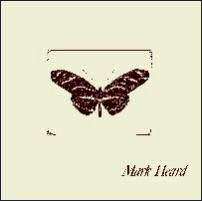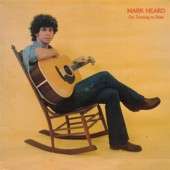Mark Heard (album)
Mark Heard is the first solo album by Mark Heard, originally released in 1975, and re-released as On Turning to Dust on both AB Records and Solid Rock Records in 1978.[1]
| Mark Heard | ||||
|---|---|---|---|---|
 | ||||
| Studio album by | ||||
| Released | 1975, 1978 | |||
| Studio | Lemco Studios, Lexington, Kentucky | |||
| Genre | Folk, Rock | |||
| Label | Airborn | |||
| Producer | Mark Heard | |||
| Mark Heard chronology | ||||
| ||||

A limited edition CDR reissue of the original Mark Heard album was released to fans in 1998 through Fingerprint Records.
Track listing
All songs written by Mark Heard, except "Cabin in Gloryland" by O. A. Parris, writer /Cpl. Curtis Stewart. "Greensleeves interlude" is a 16th-century English melody. "There is a Fountain" is an early American melody, words by William Cowper, 1771. "Passion Chorale" is by Hans Leo Hassler, 1601; harmony by J. S. Bach, 1729, words by Bernard of Clairvaux, 11th century. "Dinner at Grandma's" - by Mark Heard, Pat Terry, Jeff Vansant, Wayne King.
Side one
- "On Turning to Dust"
- "Dinner at Grandma's"
- "Cabin in Gloryland"
- "A Friend"
- "Lullabye"
Side two
- "Solid Rock"
- "To Diane"
- "Interlude (traditional: Greensleeves & There Is a Fountain)"
- "The Road"
- "Interlude (Traditional: Passion Chorale)"
- "All"
The band
- Mark Heard – guitars, vocals, piano, synthesizer and hambone
- Earl Grigsby – bass guitar
- Frank Godby – banjo
- John Heinrich – pedal steel guitar
- Chuck Long – sandblocks
- Jim Pennington – percussion
- Dave Aldrich – string arrangement
- Lamay String Quartet – string section
Production notes
- Cecil Jones – engineer
- Mark and Janet Sue Heard – photography and cover design
- Lemco Studios, Lexington, Kentucky – recording location
References
- Powell, Mark Allan (2002). Encyclopedia of Contemporary Christian Music. Peabody, Massachusetts: Hendrickson Publishers. p. 407. ISBN 1-56563-679-1.